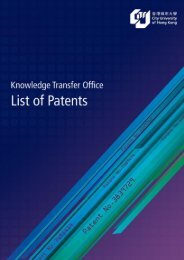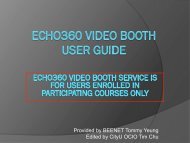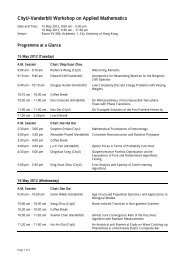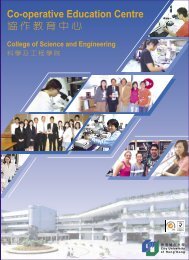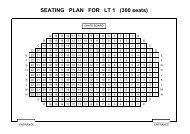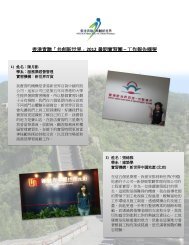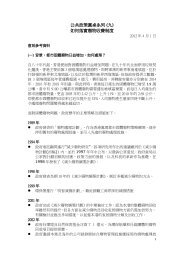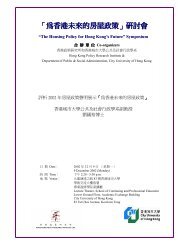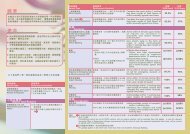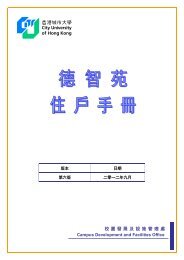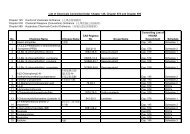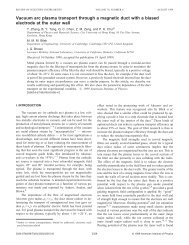Louis Liu Department of Systems Engineering and Engineering ...
Louis Liu Department of Systems Engineering and Engineering ...
Louis Liu Department of Systems Engineering and Engineering ...
Create successful ePaper yourself
Turn your PDF publications into a flip-book with our unique Google optimized e-Paper software.
<strong>Louis</strong> <strong>Liu</strong><br />
<strong>Department</strong> <strong>of</strong> <strong>Systems</strong> <strong>Engineering</strong> <strong>and</strong> <strong>Engineering</strong> Management<br />
City University <strong>of</strong> Hong Kong
Experience Sharing<br />
�<br />
�Starting from 2004, we have lead CityU<br />
students joining the inter-university robot<br />
competition, called Robocon.<br />
�Starting from 2007, we developed a purely<br />
Problem-Based Learning course, called<br />
Intelligent Robot Design.<br />
�It is a course to train the students for joining<br />
the robot competition.
Outcomes<br />
�<br />
�Most <strong>of</strong> the students joining the PBL course <strong>and</strong><br />
Robocon scored very high grades in their Final<br />
Year Project.<br />
�They showed their ability <strong>of</strong> solving problems,<br />
<strong>and</strong> work independently.<br />
�They developed good learning attitude<br />
�They Improved sense <strong>of</strong> belonging
Motivation: from IN to OUT<br />
�<br />
�Students change their learning attitude<br />
significantly.<br />
�The motivation is from “inside” to “outside”.<br />
�The improvement is very effective.
Advantages <strong>of</strong> Applying PBL to<br />
GE courses<br />
�<br />
�Students nowadays want to learn when they<br />
feel that they need to learn.<br />
�PBL provides them the reasons to learn.
How to include PBL to GE courses?<br />
�<br />
�Course Intended Learning Outcomes<br />
�Inquiry Based Learning Activities<br />
�Assessment <strong>of</strong> the Effectiveness <strong>of</strong> Student’s<br />
Learning<br />
�Other Expected Outcomes
Course Intended Learning Outcomes<br />
�<br />
�Describe what the given problem is<br />
�Design a method to solve the problem<br />
�Develop the designed solution (the hard<br />
<strong>and</strong>/or s<strong>of</strong>t way)<br />
�Demonstrate reflective team work
Inquiry Based Learning Activities<br />
�<br />
�Large Class Activity: Introduction <strong>of</strong> the problem<br />
�Small Class Activity: Students take active role to:<br />
� Determine what the problem is exactly about<br />
� Sort out the information needed to underst<strong>and</strong> the<br />
problem deeply<br />
� Develop possible solutions for the problem<br />
� Analyze the results<br />
�Presentation <strong>of</strong> findings
Assessment <strong>of</strong> the effectiveness<br />
�Written Report<br />
�Oral Presentation<br />
�Demonstration<br />
�Reflective Journals<br />
�Peer Evaluation<br />
<strong>of</strong> student’s learning<br />
�
Other Expected Outcomes<br />
�<br />
� Learnt the way to learn<br />
� Improved problem solving ability<br />
� Motivated in critical thinking<br />
� Enhanced communication skill<br />
� Improved team-work ability
Conclusion<br />
�<br />
� Not only the students will be benefited.<br />
� Teaching staff will be satisfied with their students<br />
being actively engaged in learning.<br />
� Also, students will have a higher sense <strong>of</strong> belonging.



